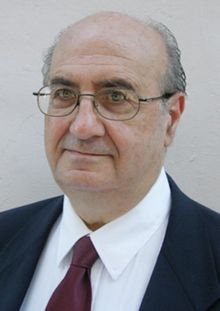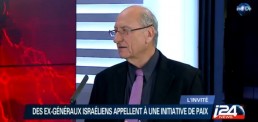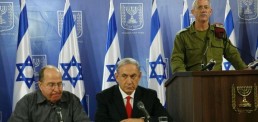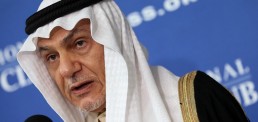In Search of Leadership Israeli Ex-General Critical of Netanyahu’s Leadership
CounterPunch | by CESAR CHELALA | November 7, 2014
106 former high-ranking Israeli members of the armed forces and police and intelligence officers have called on Israel’s Prime Minister Benjamin Netanyahu to make a strong move for peace with the Palestinians. In a letter to the Prime Minister, the army and police officers said that Netanyahu should seriously pursue peace with the Palestinians stating, “We, the undersigned, reserve Israel Defense Forces (IDF) commanders and retired police officers, who have fought in Israel’s military campaigns, know first-hand of the heavy and painful price exacted by wars.” The officers called on Netanyahu to embark on a “courageous initiative” and make peace with the Palestinians and other Arab countries.
The letter came at a time when the situation is rapidly deteriorating in Gaza and in Jerusalem. Following an October 24 suicide attack in the Sinai Peninsula where some 30 policemen were killed, Egypt closed the Rafah crossing, a 12 km long border between Gaza and Egypt. The situation worsened last weekend when Israel also closed its two main border crossings after an anonymous group launched a mortar shell at Israel –the second incident after the August 27 truce.
As a result of those actions by Egypt and Israel, the Gaza Strip is now totally sealed off, leaving its inhabitants, foreigners and sick people totally isolated, even those in need of medical care. “Gaza had turned into a big prison, and now it will turn into a huge graveyard,” said Fatima Hassan, a 56-year-old breast cancer patient from the town of Khan Younis in the Southern Gaza Strip.
In the letter addressed to Netanyahu, the Israeli officials state, “We fought bravely for the country in the hope that our children would live here in peace, but we got a sharp reality check, and here we are again sending our children out into the battlefield. This is not a question of left or right. What we have here is an alternative option for resolving the conflict that is not based solely on bilateral negotiations with the Palestinians, which have failed time and again.”
The letter is the brainchild of major general Amnon Reshef, a former armored corps commander. According to the Ynet news website, Reshef, who had fought in The Battle of the Chinese Farm, which took place in 1973 between the Egyptian Army and the Israel Defense Forces (IDF), as part of the Yom Kippur War, was sick and tired of repeated fighting instead of adopting one of the Arab peace initiatives such as the Saudi proposal of 2002.
The Saudi Initiative, also called the Arab Peace Initiative, is a comprehensive peace proposal first put forward in 2002 at the Beirut Summit of the Arab League by then Crown Prince, King Abdullah of Saudi Arabia and re-endorsed at the Riyadh Summit in 2007.
The initiative intended to end the Arab-Israeli conflict and bring peace to the region. The normalization of relations between the Arab countries and Israel was conditioned on the complete Israeli withdrawal from all occupied territories and a just settlement of the Palestinian refugee situation based on UN resolution 194 (which calls for a diplomatic resolution to the conflict and resolves that any refugees “wishing to return to their homes and live at peace with their neighbors” should be able to do so or, if they otherwise wish, should be provided with compensation.)
George Mitchell, then the United States special envoy to the Middle East, announced in March 2009 that President Barack Obama’s administration intended to “incorporate” the initiative into its Middle East policy. This opinion wasn’t supported by later events.
Prime Minister Netanyahu’s refusal to take a more active role to end the conflict was severely criticized by several of the letter signers who stated that Israel had the means to reach a two-state solution without jeopardizing the country’s security by had failed to do so because of weak leadership. As the signers of the letter wrote to Netanyahu, “We expect a show of courageous initiative and leadership from you. Lead – and we will stand behind you.”
 Dr. Cesar Chelala is a winner of an Overseas Press Club of America award.
Dr. Cesar Chelala is a winner of an Overseas Press Club of America award.
Removing irritants is a must to end conflict
The Israeli generals who wrote the letter to Netanyahu seem to be sincere in their appeal because they have seen that armed conflicts couldn’t solve such complicated issues. During the past several decades, all parties made many mistakes and lost many chances to end the conflict.
By Abdulateef Al-Mulhim | arabnews | November 5, 2014
A few hundred yards away from where I live, stands a huge blue and yellow building with four letters written on the simple façade, IKEA. My family likes to shop from the store but there is a string attached to it. I don’t mind visiting the place and buying from there but I have made it clear that I should not be bothered about assembling the goods purchased from that store. I pay for it but religiously avoid playing any role in the assembling phase.
I had always viewed assembling an IKEA product to be the most complicated thing in the world. Interestingly, last week Israeli Foreign Minister Avigdor Lieberman told his Swedish counterpart that the Middle East was more complicated than self-assembly furniture at IKEA. The question that naturally comes to one’s mind is: What strategy to adopt in the face of a complicated situation? The obvious answer is: One attempts hard to simplify the problem by removing hurdles or complicated issues to reach a solution. It is unwise to delay, as it only aggravates a situation.
One has to agree with Lieberman that Middle East is very complicated. But, let us face the reality of how long do we have to wait before the concerned parties seriously sit down and try to solve the Middle East’s agonizing problem called the Palestinian- Israeli conflict?
During the last two weeks, the media outlets were flooded with analysis and commentaries on the issue calling for a just and viable solution to the problem once and for all. Actually Swedish recognition of the State of Palestine has added a new dimension to the issue. Such a move from a western country was bound to attract global attention. As expected, it has created ripples in major world capitals, particularly in Israel.
I think that Sweden did not only recognize the Palestinian state but it also put the Israelis and the Palestinians to the test. In other words, Sweden has posed a billion-dollar question to both sides: How serious are the two parties to achieve lasting peace?
Following Swedish recognition of Palestinian state, many in Israel termed the Swedish move premature. Ironically, few days after Sweden’s recognition, an Israeli newspaper reported the largest-ever joint protest by senior Israeli security personnel, a group of 106 retired generals, Mossad directors and national police commissioners in which they all signed a letter to Prime Minister Benjamin Netanyahu urging him to “initiate a diplomatic process” based on a regional framework for peace with the Palestinians.
The campaign was initiated by a former Armored Corps commander, reserve Maj. Gen. Amnon Reshef. He told Israel’s Yedioth Ahronoth that he was “tired of rounds of fighting every few years instead of a genuine effort to adopt the Saudi initiative.” The reserve major general was referring to 2002 Saudi-backed peace initiative.
Today, most people on both sides want lasting peace. Many, however, wonder whether it would be based on one or two states. And who should make the initiative to restart a serious peace negotiation. I think the first step to do it is to stop all forms of armed conflicts and all forms of violence because violence can’t go on forever. The two parties can either ask for a global conference to discuss the issue and then both sides should themselves come up with a solution. Resolution of this issue needs courage from both the Palestinians and the Israelis to draw a road map for the future generations.
The Israeli generals who wrote the letter to Netanyahu seem to be sincere in their appeal because they have seen that armed conflicts couldn’t solve such complicated issues. During the past several decades, all parties made many mistakes and lost many chances to end the conflict.
We all know that the Palestinian State has no definite borders or no one knows how can it be administered because of the geographical separation between Gaza Strip and the West Bank, but both the Palestinian and Israelis should look at Sweden’s recognition of a Palestinian State from different angles and use it to launch peace efforts afresh. Most important thing is to end the agony and misery of the forgotten Palestinians — the refugees.
 Abdulateef Al-Mulhim is a retired Commodore in the Royal Saudi Navy and a journalist.
Abdulateef Al-Mulhim is a retired Commodore in the Royal Saudi Navy and a journalist.
Major General (res.) Amnon Reshef interviewed on i24 TV Channel
Major General (res.) Amnon Reshef interviewed in "Grand Direct" on i24 TV Channel
November 5, 2014
https://www.youtube.com/watch?v=ekAqTmm8CcQ
106 retired Israeli generals, spy chiefs urge Netanyahu to push for peace
Israel has the strength and means to reach a two-state solution that doesn't entail a security risk, signatories write in a letter sent to the prime minister.
Haaretz | By The Forward and J.J. Goldberg | Nov. 3, 2014
In what appears to be the largest-ever joint protest by senior Israeli security personnel, a group of 106 retired army generals, Mossad directors and national police commissioners have signed a letter to Prime Minister Benjamin Netanyahu urging him to “initiate a diplomatic process” based on a regional framework for peace with the Palestinians.
Several of the signers told Israel’s Mako-Channel 2 News in interviews that Israel had the strength and the means to reach a two-state solution that “doesn’t entail a security risk,” but hadn’t managed to reach an agreement because of “weak leadership.”
“We’re on a steep slope toward an increasingly polarized society and moral decline, due to the need to keep millions of people under occupation on claims that are presented as security-related,” Maj. Gen. (res.) Eyal Ben-Reuven told Mako’s Roni Daniel. “I have no doubt that the prime minister seeks Israel’s welfare, but I think he suffers from some sort of political blindness that drives him to scare himself and us.”
The letter was initiated by a former Armored Corps commander, Maj. Gen. (res.) Amnon Reshef. He told Yedioth Ahronoth in an interview published Friday, and posted in English on Yedioth’s Ynetnews.com website, that he was “tired of a reality of rounds of fighting every few years, instead of a genuine effort to adopt the Saudi initiative.”
He was referring to the Saudi-backed peace proposal that was adopted unanimously by the Arab League in 2002 (here is the full text) and later endorsed 56-0 by the 57-member Organization of Islamic Cooperation, with Iran abstaining. It has since been repeatedly reaffirmed and its terms softened. As currently framed, it offers full peace, diplomatic recognition and “normal relations” between the Arab states and Israel in return for Israeli withdrawal to borders based on the pre-1967 armistice lines, with negotiated land swaps, and a “just” and mutually “agreed” compromise solution to the Palestinian refugee problem.
The generals’ call echoes a proposal for a regional peace conference that was floated during the Gaza war this summer by Israel’s science minister, Yaakov Peri, a member of Yair Lapid’s Yesh Atid party and a former director of the Shin Bet security service. It’s currently being advocated within the security cabinet by Lapid and justice minister Tzipi Livni.
Netanyahu takes the position that Palestinian statehood at this juncture would imperil Israel’s security.
Retired generals have occasionally made joint statements in the past, but never in such numbers and rarely on political matters that aren’t directly related to army business. In January 2012, 52 ex-generals signed a petition calling for legislation to require military or equivalent national service for Haredi men. In November 2011, 19 ex-generals called on IDF chief of staff Benny Gantz to combat growing religious extremism in the army. In February 2010, 15 ex-generals signed a statement criticizing “leftist organizations,” including the New Israel Fund, that they said had damaged the IDF by aiding the Goldstone Report.
The 106 signers of the current letter to Netanyanu include 101 IDF veterans with the rank of brigadier or major general, as well as two former chiefs of the Mossad intelligence agency and three former commanders of Israel’s National Police.
The generals’ letter apparently doesn’t refer directly to the Arab Peace Initiative, but in calling for a regional process it appears to rely on the willingness of the Saudis and Egyptians to sponsor a conference leading to negotiated peace that renders “the Arab-Israeli conflict ended,” based on the initiative.
The purpose of enlisting the neighboring Arab states is to give the Palestinian leadership backing and legitimacy to accept compromises it has failed to embrace on its own in bilateral talks.
Here are the portions of the letter published by Yedioth (translation by Ynetnews):
"We, the undersigned, reserve IDF commanders and retired police officers, who have fought in Israel’s military campaigns, know firsthand of the heavy and painful price exacted by wars.
"We fought bravely for the country in the hope that our children would live here in peace, but we got a sharp reality check, and here we are again sending our children out onto the battlefield, watching them don their uniforms and combat vests and go out to fight in Operation Protective Edge…
"This is not a question of left or right. What we have here is an alternative option for resolving the conflict that is not based solely on bilateral negotiations with the Palestinians, which have failed time and again … We expect a show of courageous initiative and leadership from you. Lead – and we will stand behind you."
Article Link » http://www.haaretz.com
Photo by Ofer Vaknin
Ex-generals, police chiefs tell PM: Resume peace talks
In letter to Netanyahu initiated by Major General (res.) Amnon Reshef, 105 retired and reservist officers call for broader negotiations with entire region: 'Lead - and we will stand behind you.'
Ynetnews | Nechama Duek | 11.02.2014
If you add up the total number of the years they spent in the Israel Defense Forces, the Israel Police and the Mossad, you come to the incomprehensible sum of more than 3.5 millennia in the service of state security. And now, 105 former high-ranking army and police officers and Mossad chiefs have decided to join together and step out of their private comfort zones to sign a letter calling on Prime Minister Benjamin Netanyahu "not to join the ranks of those who use threats as an excuse for resting on our laurels, and to initiate a political process."
We're not dealing here with serial signatories whose names and ranks adorn every petition for peace or in support of a Greater Israel. The names this time are different. Among them are ex-generals who left their uniforms behind a long time ago, like former Mossad chief Zvi Zamir and retired Major General Amiram Levin. And you'll also find major generals like Dani Biton and Avi Mizrahi, who parted ways with the Israel Defense Forces only recently and were members of the General Staff that embarked on Operation Cast Lead. They more than anyone else are familiar with the reality on the ground. The signatories also include three former police chiefs – Assaf Hefetz, Yaakov Turner and Herzl Shafir.
"We, the undersigned, reserve IDF commanders and retired police officers, who have fought in Israel's military campaigns, know first-hand of the heavy and painful price exacted by wars," reads the letter initiated by Major General (res.) Amnon Reshef, a former Armored Corps commander, who says he's sick and tired of a reality of rounds of fighting every few years instead of a genuine effort to adopt the Saudi initiative.
"We fought bravely for the country in the hope that our children would live here in peace," the letter continues, "but we got a sharp reality check, and here we are, again sending our children out onto the battlefield, watching them don their uniforms and combat vests and go out to fight in Operation Protective Edge… This is not a question of left or right. What we have here is an alternative option for resolving the conflict that is not based solely only on bilateral negotiations with the Palestinians, which have failed time and again… We expect a show of courageous initiative and leadership from you. Lead – and we will stand behind you."
We sat down to speak with four of the signatories in the yard of Reshef's home in Tel Aviv. Joining us were Major General (res.) Hagai Shalom, former head of the IDF's Technological and Logistics Directorate and current businessman and owner of the Tiv Ta'am chain and the Argaz company; Major General (res.) Eyal Ben-Reuven, former commander of the IDF colleges who still performs reserve duty as deputy GOC Northern Command; and Major General (res.) Avi Mizrahi, former GOC Central Command and current deputy CEO of Elbit.
From Gaza to Berlin
For Shalom, who left the military in the mid-1990s, this is the first time he's agreed to lend his signature to a petition of any kind.
"I fear for the future of the country," he says, explaining the deviation from his norm. "The situation here has never been a simple one, but the picture appears blacker than usual of late. There's a lack of purpose. You don't see anyone taking the lead along a chosen path, towards hope. Prime Minister Netanyahu is very talented and he's a fighter, but he's caught up with his own political survival – and that, rather than the fate of the country, is the main focus of his concerns. Unfortunately, the country needs more these days.
"I don't know if the petition will lead to change, but we have to start somewhere. We need to find a way to unite all the sane voices, inside and outside government, so as to put an end to the processes that lead us into dangerous situations. And I'm talking about Tzipi Livni and Yair Lapid. Anyone who chooses to remain in the government, from the right or the center, and lends a hand to the government without instigating a political process is committing a very big sin."
Mizrahi, too, has steered clear thus far of petitions and letters of this kind. He retired from the IDF two years ago and took a year off before joining Elbit. "I haven't signed petitions or letters before because I was still in uniform," Mizrahi says. "Now, too, I joined in because the letter is correctly and appropriately worded. It's not categorized as left or right, but expresses instead genuine concern for the fact that nothing is happening. As a military man I'm able to say with certainty that we will achieve the best security if there is peace here."
Petitions from the left or the right are published every few months. What makes the current one any difference?
Reshef: "The difference is in the message, and in particular in the number of signatures at the end of the letter that is addressed to the Prime Minister, but through him to the public at large, too. Read the names of the signatories. They're all combat soldiers, major generals and brigadier generals – and please forgive me, my comrades of other ranks, for not managing to reach you. I was fired up. I saw Egyptian President Abdel Fattah el-Sisi call on Israel to enter into negotiations, and no one in Israel is picking up the gauntlet.
"I saw us launch operation Protective Edge and got the sense that we've become accustomed to yet another round of fighting every three years. I was fired up. I wrote the petition and I thought I would get the signatures of 40-50 senior officers. Happily, one friend brought another, and hardly anyone refused. The power in the names is unique and a one-off occurrence."
Ben-Reuven: "We've spent most of our lives in the world of war. When you're there, you look at things differently than you do when you're in civilian life, where I started looking through a broader prism. The further away from it I move and look back, the more I realize just how much the issue of the world of war is folly and offers zero benefit."
Were all the wars unnecessary?
"The recent wars only intensified their lack of purposefulness. Don't get me wrong, I'm not discounting the problematic environment in which we live, and the fact that we need to be strong therein. We've established an empire here - Economic and security. But we are using the tools at the disposal of the empire in the worst possible way. Instead of using force to prevent the folly of the world of war, we have become a society led by statesmen who are taking us to the extreme and a shortsighted viewpoint that centers on force, force and more force. This I see as an existential threat in the near future."
Reshef: "We argue in the letter that the Yom Kippur War stemmed from political blindness. I also say that if there's no political follow-up to operation Protective Edge its fallen soldiers were in vain. And if so, what did the residents of the Gaza-boarder communities suffer for, and why did we need this trauma for the entire population, if already now they're talking about a second and third round. For God's sake, there is a solution that could prevent the following rounds. We need to come to a settlement with the moderate Arab states, which have more leverage over the Palestinians than we do."
Do you really believe that we can reach a comprehensive political settlement?
Reshef: "Definitely - establish a Palestinian state and reach a comprehensive agreement with dozens of Arab states in the region."
Ben-Reuven: "Today I believe that the State of Israel must make every effort to reduce the potential for conflict in the region. When looking at the region around us, it is a barrel of fuel surrounded by candles. All it takes is a minute for everything to explode. The current situation in the Arab world has actually created an opportunity that needs to be built upon to promote a different regional peace. And it can be done because we are strong."
Mizrahi: "That's a tricky question because everyone has their own definition of the term 'comprehensive regional peace'. Until now, by the way, we've failed when trying to speak only with the Palestinians, so perhaps a comprehensive move would be more successful. But if you'll allow me to reach even higher, Egypt and Israel share an interest in solving the problem. For example, Sinai is a large area of land most of which is undeveloped or uninhabited. If the Egyptians were to donate a few dozen square kilometers to the Gaza Strip, it could be beneficial to the joint development of the area and create a situation in which they, too, and not only we are in the game."
Shalom: "I believe that the situation in which Israel finds itself today can be changed. The world in general and the Arab world in particular are bubbling over and we could have taken advantage of the situation to move forward. But instead of doing, there is unnecessary chatter against the superpower, the United States, which is always there when we need it. The crisis with them is inappropriate, undignified and stupid."
Meanwhile, there are young Israelis who are choosing to go live in Berlin. Is this a consequence of the situation?
Shalom: "I don't want to hear of Berlin. Unfortunately, as a businessman I can say that the government chooses to fight businesses rather than make things easier for them, and it all rolls over to the consumer who struggles under the burden. My businesses are in Israel. I didn't go abroad – not because we don't have any cause for despair, but because we are doomed if we despair. The prime minister understands economics and he must alleviate the cost-of-living burden on the young and the weaker segments of the population."
How?
Shalom: "By dropping VAT on basic products – an 18 percent reduction would be a huge relief for the weaker strata. The problem is that there's no ruling authority, neither political nor economic, and the prime minister invests most of his resources in politics and not the economy."
Mizrahi: "If you were to ask me where to invest, I would say education. The cost of living bothers me too, and I earn well. I lived abroad for a few years and believe me I could have become a millionaire had I stayed there; but this is my country and I came back. The young people's protest is just, and if they take to the streets, I will join them. But there's a big gap between that and leaving the country."
We would appreciate your response
The abduction and murder of the three Israeli teenagers, the shocking murder of Mohammed Abu Khdeir, and the attempted assassination last Wednesday of right-wing activist Yehuda Glick are just some of the recent events that have brought the already volatile situation between Arabs and Jews in Jerusalem to the boiling point.
"We are not seeing the start of a third intifada," Mizrahi determines. "I say this based on knowledge rather than an assessment. The Palestinians and their leadership don't want friction. The current situation will calm down soon. Moreover, an intifada isn't the thing that should prompt us into a political settlement; but if there is no political settlement, the region will eventually burst into flames.
"In addition, they seem to be under the impression that when we are pressed, we are more generous when it comes to concessions. Take that into consideration. In the absence of hope, the quiet will not last forever. Furthermore, a settlement is good for Israel's security. We have to try, so that we can tell our children that we tried and did all we could."
Despite the lack of a peace agreement, the country is flourishing. It's impossible to find a parking space or a table at a restaurant, and perhaps the right-wing is right in saying that the Palestinians will eventually realize that they're not going to get a state, and they'll get used to the situation and live with us in peace.
Mizrahi: "Just this week, UNICEF published a report on the terrible state of Israel's poor children. The country is prospering because there people here are powerfully driven to show that despite the situation, they will succeed. But let's not fool ourselves – if they don't invest, if they don't reach a settlement, either we will lose the next war, and this is hard to see, or we will pay a very heavy price in casualties."
Shalom: "Israel is an amazing country. It has talented, diligent, innovative people. The problem is not the people, but the weakness of the government, or the lack of government, which has created intolerable gaps – and 90 percent of the blame rest on the government's shoulders."
Ben-Reuven: "The national leadership brainwashed us with the idea of a Greater Israel – from Rabin and Peres and northwards. Today, sanity must be restored to the public and we need to make it clear that there is a way to combine forces and interests and to reach political settlements. I have no doubt that if they were to bring such a settlement to a referendum, more than 70 percent would be in favor of it."
Is Netanyahu made of the right stuff? Is he capable of achieving a settlement?
Reshef: "Theoretically? He's capable. Does he want to? I don't have an answer to that."
Shalom: "I don't believe that Bibi will do something if he has the choice not to do it. He'll be forced to act only if he has no choice or in the event of elections. Perhaps the only way to change the current situation is through elections. Even if a government under his leadership were to come into power again, it would be a new beginning. Bibi is not a bad person. The problem is that the path he is walking will lead to nowhere."
Mizrahi: "Bibi is certainly capable. Will he heed our letter? That's a different question entirely."
Ben-Reuven: "He's made of the right stuff and if he wants to be, he is capable. For now, however, when looking at the end result, the man has failed."
So why are you appealing to him in the letter?
Ben-Reuven: "I'm appealing through him to the public. I signed the letter from a public perspective, in the hope that it will serve as an incentive to bring about a change in leadership."
Reshef: "We are appealing to him in the hope that he will understand that he has an opportunity to get our help. If it doesn't work out, my next goal is to put together a structured system that will allow us to organize a demonstration involving 200-300 thousand people next spring, with the message being a call for a regional political settlement that will lead to security-economic-social prosperity."
Retired military officials urge Netanyahu to push for peace
Over 100 former IDF officers, Mossad chiefs say moderation of Egypt gives hope for agreement with Abbas
I24NEWS | Published: November 01st 2014
An open letter signed by 106 retired senior military officials urging Israeli leadership to push toward a comprehensive peace agreement with the Palestinians was published as a paid advertisement in a number of Israeli newspapers.
In addition to former Israeli Defense Forces staffers, signatories to the petition include two former chiefs of Israel's foreign intelligence agency Mossad and retired senior police officials.
The petition was initiated by the retired Major-General Amnon Reshef, who said the moderate politics states such as Egypt, Jordan and Saudi Arabia represent an opportunity for Israel to forge close ties with the Arab world that would go a long way toward bridging the gaps with the Palestinians.
Israel was reported to be enjoying a healthy working relationship with Egyptian President Abdel-Fattah al-Sisi, and the two countries' militaries have cooperated during the 50 day-long war between Israel and the Gaza-based terrorists of Hamas this summer.
Reshef said he hoped the security cooperation with Egypt would pave the way for a Sisi-brokered peace agreement with Palestinian President Mahmoud Abbas' Fatah party; thus he found himself disappointed by the course adopted by Prime Minister Benjamin Netanyahu.
“I was hoping that once Operation Protective Edge is finished, the premier would launch some kind of political process. This never came to be, there was no positive reaction," the retired general was quoted by Channel 2 News as saying.
"What I did see, however, was the expansion of Jewish settlements in the East Jerusalem neighborhood of Silwan, all manner of delusional thoughts on building in the West Bank and authorization of illegal settlements. This trend upset me deeply."
When asked regarding the likelihood of reaching a peace deal with Abbas, who has this week pronounced Friday a "day of rage" in Jerusalem following Israel's decision to close the Temple Mount for Muslim worshipers, Reshef said Israelis should look beyond the Palestinian leader's oft-bellicose rhetoric, just as one should not take all of Netanyahu's statements at face value.
Earlier this week, Egyptian officials notified Hamas and other Palestinian factions that the upcoming round of indirect talks regarding a ceasefire agreement between Gaza militants and Israel has been postponed.
The announcement comes in the wake of a deadly attack in the northern Sinai Peninsula in which a militant drove a car rigged with explosives into a military checkpoint, killing 30 Egyptian police. In response, Egypt has shut down its border crossing with the Gaza Strip.
The talks, set up to iron out details of an August truce that ended five weeks of deadly fighting in Gaza, were scheduled for Monday. Fawzi Barhoum, a spokesman of the Hamas movement, told the Palestinian Ma'an new agency that Egypt informed Hamas officials that the talks had been postponed. But Israel's chief representative to the talks, Amos Gilad, told Israeli Radio that he had not received any word from Egypt regarding a postponement of Monday's session.
Peace would be possible with the Arab Peace Initiative at its core
The 2002 initiative still provides a template for a just solution to Israel’s conflict with the Palestinians and the Arab world
By Turki Al Faisal | Jul. 7, 2014 | Haaretz
Sometimes, at the darkest moments, what matters is that men and women of courage and imagination not only hold on to the idea of peace, but also try to imagine what that peace might look like.
Nowhere is this truer than in the Middle East. Two peoples – Palestinians and Israelis – are seeking to realize their dream of statehood. Only a two-state solution can give flesh to that dream, and meet the national aspirations of the two peoples. Such a solution was at the heart of the vision set out by the UN General Assembly in the 1947 partition plan, but which the international community failed to implement then, and which many peace processes since have failed to bring into being.
The result is a human tragedy, for Palestinians living under the unjust burden of Israeli occupation, and also for Israelis, trapped in a situation which over time sharpens their international isolation. With the efforts of U.S. Secretary John Kerry currently paused, and with disillusion growing as a result of this latest setback to U.S. diplomacy, now, more than ever, is the time to imagine the peace all people of goodwill.
The Arab Peace Initiative, first proposed by the Custodian of the Two Holy Mosques, King Abdullah of Saudi Arabia, and adopted by the Arab League in 2002, still provides a template for peace – a formula for a just and comprehensive solution to Israel’s conflict, not only with the Palestinians but also with the Arab world, in the firm conviction that no military solution can give countries in the region the peace and security they all desire.
The API says that all the Arab countries will establish normal relations with Israel once Israel withdraws from the territories occupied in the June 1967 war, and accepts an independent Palestinian state with its capital in East Jerusalem. Exact borders and the achievement of a just solution to the problem of Palestinian refugees would, of course, have to be agreed in negotiations in accordance with international principles.
In Lebanon, the lands occupied by Israel can be ceded to the United Nations until there is a viable Lebanese government to take them; and in Syria, as well, the occupied Golan Heights can be put under UN administration until a new government can take them. With goodwill, and the backing of the United States and the Arab League, nothing is impossible.
And I hope indeed that Israelis registered the line taken by an Arab League delegation to Washington in April last year, making it clear that the API was not simplistically prescriptive, but could be adjusted to take account of whatever was freely agreed to by Israelis and Palestinians in their negotiations.
Like others in the region, I remain saddened, too, as to why there has never been an Israeli government response to the API, despite the Arab world’s continuing to endorse it at every Arab League summit over the last 12 years, and at every summit organized by the Organization of Islamic Cooperation and by the Gulf Cooperation Council. An Arab delegation went to Israel to deliver it directly to the Israeli people. Many times, there were those among the Arabs who said that it has not worked and should be discarded and abandoned. But we have stuck by it and continue to stick by it; and it is still very firmly on the table.
Let us dream for a moment of how this troubled land might look after an agreement between those two people... Let me dream, too ... Imagine if I could get on a plane in Riyadh, fly directly to Jerusalem, get on a bus or taxi, go to the Dome of the Rock Mosque or the Al-Aqsa Mosque, perform the Friday prayers, and then visit the Western Wall and the Church of the Holy Sepulchre. If, the next day, I could visit the tomb of Abraham in Al-Khalil, Hebron, and the tombs of the other prophets, peace be upon them all. I could then drive to, and visit Bethlehem, the site of the Nativity. I could go on to visit the Yad Vashem Holocaust center and museum as I visited the Holocaust Museum in Washington, when I was ambassador there.
And what a pleasure it would be to be able to invite not just the Palestinians but also the Israelis I would meet to come and visit me in Riyadh, where they can visit my ancestral home in Dir’iyyah, which suffered at the hands of Ibrahim Pasha the same fate as Jerusalem did at the hands of Nebuchadnezzar and the Romans.
Just imagine too how commerce, medicine, science, art, and culture between our two peoples would develop ...
The alternative, I fear, is continued conflict, with the realities on the ground – particularly the ongoing settlement enterprise in the occupied Palestinian territories – pushing us closer and closer to the day when the issue will no longer be how to achieve a two-state solution, but whether conflict and bloodshed will continue to be the norm. Is that really what Israel wants?
Land grabs by settlers and exclusive “for Israelis only” highways on Palestinian West Bank lands deny the viability of a contiguous and viable Palestinian nation. While paying lip service to the two-state solution, the government of Israel is pursuing a policy which is effectively creating a one-state outcome, not a one-state "solution," and it is hard to see it as anything other than a recipe for disaster, with the lack of equal political, economic, and human rights in that one state space.
I hope the Israel Conference for Peace will join in the effort to imagine the peace which would be possible with the API as the key foundation stone. And I look forward to the day when it would be possible for me to attend such a conference, and indeed for those Israelis who will be taking part to fly to Riyadh and take part in conferences on how we might all work together to address and resolve the many other pressing problems which challenge us in the region.
HRH Prince Turki Al Faisal was Saudi Arabia’s General Intelligence Chief from 1977 to 2001 and the Kingdom’s ambassador to the U.K. and Ireland from 2002 to 2005 and the U.S. from 2005 to 2006.








